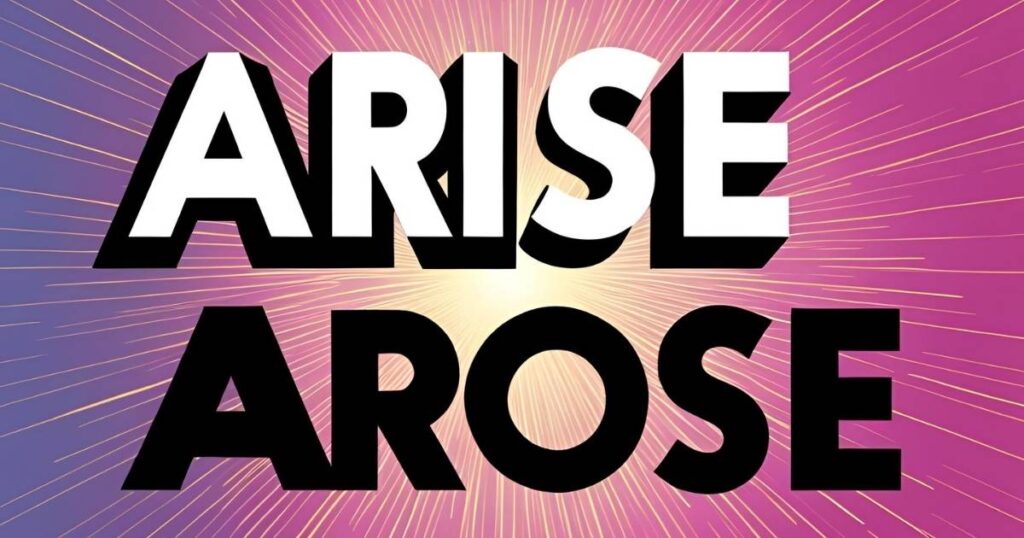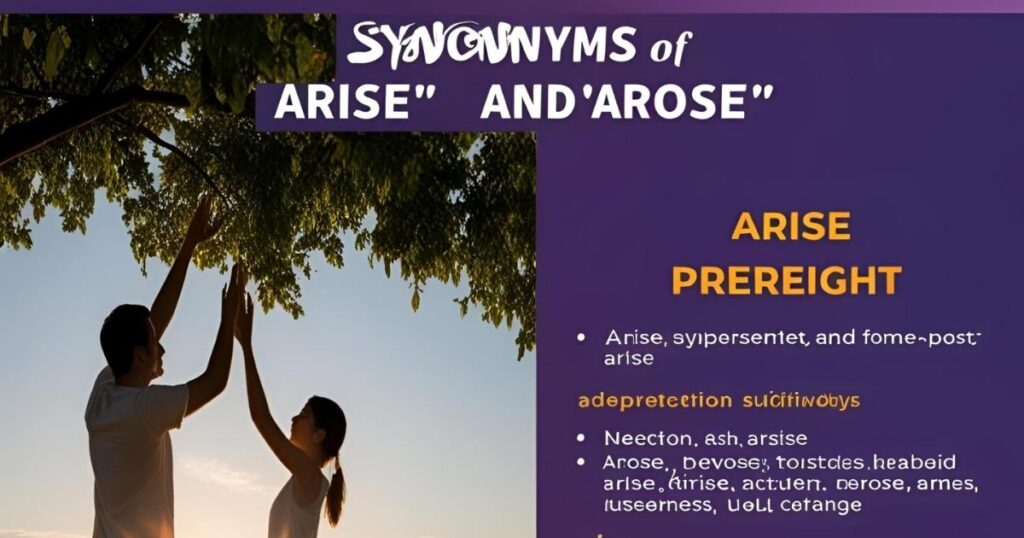Understanding verb tenses in English can be confusing, especially when it comes to irregular forms that don’t follow typical patterns. One such case is the verb “arise,” which often causes uncertainty among learners and even native speakers. My focus today is to clear up the common confusion around Arised or Arose,a mistake many make when recalling the correct past tense.
The verb “arise” doesn’t transform the way regular verbs do, which leads people to wonder whether Arised or Arose is right. This kind of grammatical slip is easy to make, especially when speaking or writing quickly. My focus is to offer clear, simple explanations to help you use the correct form naturally. So, let’s dive into the details and finally settle the debate: is it Arised or Arose?
Why is There Confusion?
The confusion between “arise” and “arose” comes from the way English verbs are usually formed. Most regular verbs in English follow a predictable pattern: add “-ed” to form the past tense. You cook → you cooked. You walk → you walked. It’s instinctive for many learners and even native speakers to think “arise” follows the same path, making them think “arised” must be right. But it’s not.
“Arise” is an irregular verb, meaning it doesn’t follow the normal rules. These verbs are a unique part of English grammar. Just like swing becomes swung, and not swinged, “arise” becomes “arose.” This pattern that deviates from the regular form can be confusing. But with a little practice and exposure, you can remember which verbs are irregular and how they behave in different tenses.
Read this Also: What’s the Past Tense of Tears? Is it Tore, Teared or Torn?
What Does the Word “Arise” Mean?

The verb “arise” has several meanings, depending on the context. Most often, it means “to come up,” “to happen,” or “to get up.” For example, when a problem occurs unexpectedly, you might say, “A problem arose during the meeting.” It’s also used when something begins, like “A feeling of hope begins to arise in her heart.”
In a more metaphorical sense, “arise” can also suggest a shift or change. Think of it like the dynamic swinging of a pendulum,the motion that creates new possibilities or opinions. In a literal sense, it may describe someone getting up from a chair or bed. Whether it’s an event, an emotion, or a movement, the word captures something beginning or emerging.
The Past Tense of “Arise”
Now that we understand the meaning, let’s look at its past form. The correct past tense of “arise” is “arose.” It’s part of a group of verbs that change completely in the past tense,like swing becomes swung, not swinged, and begin becomes began. These changes often come from deep-rooted language history and don’t follow typical patterns.
“Arose” fits naturally into this classification of irregular verbs. When telling a story or describing something that happened in the past, “arose” should be your go-to word. For instance, “A conflict arose between the two teams.” It’s clear, correct, and used by fluent speakers and writers alike.
Why It Is Not “Arised”?
You might have heard someone say “arises” at some point, especially in informal conversation. It sounds like it could be right because it follows the rule we know: add “-ed” to form the past. But here’s the thing,it’s simply incorrect. “Arised” is not found in standard English dictionaries and is considered a mistake.
This is one of those moments where grammar doesn’t follow instinct. Verbs like “arise” are irregular because they come from older forms of English, passed down through centuries. While language does change over time, “arised” has never been accepted in formal or informal English. Just like swang is rarely used today, and swung is preferred, the past tense of “arise” will always be “arose.”
Pronunciation “Arise” and “Arose”

Let’s talk about pronunciation. “Arise” is said as /əˈraɪz/, where the ending has a soft “z” sound. The word “arose” is pronounced /əˈroʊz/, with a long “o” sound in the middle. Practicing these sounds helps your English sound smoother and more natural.
Both words start with the “a” sound followed by “r,” just like in “around” or “awake.” The difference comes in the endings. If you know how to say “bring” and “ring,” you’ll find that “arise” feels similar in flow. “Arose” is a bit more dramatic in tone, which fits its use in past events or dramatic storytelling.
A Simple Table Showing the Present, Past, and Future Tense of the Verb “Arise”
| Tense | Example |
| Present | I wake up early every day. |
| Past | A question arose during the debate. |
| Future | A challenge will arise soon. |
| Present Perfect | Many issues have arisen. |
| Past Perfect | Trouble had arisen before help arrived. |
| Future Perfect | Something will have arisen by then. |
| Present Continuous | I am arising from bed now. |
| Past Continuous | I was rising when the alarm rang. |
| Future Continuous | I will be arising at dawn. |
Examples of “Arise” and “Arose” in Sentences
Here are some examples to help you. “The sun arose early today.” This is the right way to use arose. You would never say “The sun rises early.” Another example: “A problem arose during the meeting.” You can see that arose works in the past tense. Arised or arose might seem tricky, but always remember to use arose when talking about the past.
Present Tense (“Arise”):
Sometimes, challenges arise when you least expect them. Every day, new opportunities arise at work. If problems arise, you need to handle them calmly. People often arise early to catch a morning flight. Questions always arise during big decisions.There are some examples .
Present Tense (“Arise”):
- Issues often arise in difficult situations.
- Uncertainty can arise when plans change unexpectedly.
- New ideas frequently arise during brainstorming sessions.
- Tension may arise when goals are unclear.
- Opportunities arise when least expected.
- Concerns arise when deadlines are missed.
- Questions arise in conversations about complex topics.
- Misunderstandings arise between colleagues sometimes.
- Challenges arise when you step out of your comfort zone.
- Concerns arise over safety when working in hazardous conditions.
Past Tense (“Arose”):
A heated argument arose during the meeting. When he opened the old book, a strange smell arose. Tension arose between the teams after the last match. A conflict arose from a simple misunderstanding. A feeling of doubt arose in her heart as she read the letter. There are some examples :
Past Tense (“Arose”):
- Tension arose when the decision was delayed.
- A sense of relief arose after the announcement.
- A problem arose with the project’s timeline.
- A debate arose over the new policies.
- Discomfort arose when the team was divided.
- Confusion arose after the meeting ended.
- A sense of pride arose in the group after the achievement.
- A conflict arose due to differing opinions.
- Disagreements arose about how to proceed.
- A sudden question arose that needed immediate attention.
Synonyms of “Arise” and “Arose”

The words arised or arose can sometimes confuse people. Both come from the verb “arise,” but they have different meanings. Arose is the correct past tense form of “arise,” notarised. Synonyms for “arise” include “emerge,” “appear,” and “wake up.” For “arose, you can use “occurred” or “happened.” These synonyms help add variety to your writing and make it clearer. So, when you’re unsure whether to use arised or arose, remember arose is always right.
| Synonyms for “Arise” | Example Sentence | Synonyms for “Arose” | Example Sentence |
| Emerge | “New ideas often emerge from brainstorming.” | Emerged | “A conflict emerged during the negotiations.” |
| Occur | “Problems occur when the guidelines are not followed.” | Occurred | “An error occurred in the final report.” |
| Appear | “Difficulties appear when least expected.” | Appeared | “A problem appeared out of nowhere.” |
| Develop | “Issues develop as the project advances.” | Developed | “An issue developed after the system update.” |
| Surface | “Concerns surface during the final review.” | Surfaced | “Old grievances surfaced during the meeting.” |
| Originate | “The dispute originates from a misunderstanding.” | Originated | “The challenge originated from an earlier decision.” |
| Manifest | “Symptoms manifest after the treatment is administered.” | Manifested | “A problem manifested after the procedure.” |
Synonyms for “Arise”:
Common alternatives include emerge, occur, begin, appear, or surface. These words can often be used in both literal and metaphorical senses. For example, “A problem may emerge during testing,” or “New ideas often surface during brainstorming.”
Synonyms for “Arose”:
You can use originated, came up, emerged, developed, or cropped up. Each has its own tone and best usage, but they all point to the same idea,something happened or came into being in the past.
Origins of the Word “Arise”

The word “arise” has ancient roots. It comes from Old English arīsan, which itself was derived from the Proto-Germanic word arīsōnan. This older word meant “to get up” or “to rise.” Over time, the word evolved into the more modern form “arise.”
This history is similar to how words like swing came from swengan, a Proto-Germanic term meaning “to shake” or “to whip.” That’s why we say swung instead of swinged. These origins help explain why some English verbs don’t follow usual grammar patterns,they’re shaped by centuries of evolution and change.
Conclusion
Now you know the answer to the question: Arised or Arose, which one is right? The correct past tense of “arise” is “arose.” You should never use arises because it’s not a real word in English grammar. Many people get confused and say arised or arose without knowing the rule. But now, you understand the difference. You can speak and write with more confidence.
Always remember, when thinking about arised or arose, go with “arose.” It follows the correct irregular verb pattern. If you ever hear someone ask about arised or arose, you’ll know how to explain it. Keep practicing your grammar and learn more about verbs. Don’t forget this rule. Arised or Arose may seem tricky at first, but with this knowledge, you’re one step ahead in mastering English.

Gramcoachpro is your go-to platform for mastering grammar, writing, and communication skills. If you’re a student, teacher, or content creator, we provide easy-to-understand tips, examples, and tools to improve your language — fast and effectively. Our mission is to make better writing simple and accessible for everyone.

